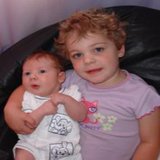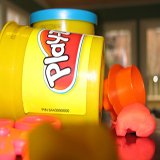Stimulating Eye Hand Coordination - 22 Month Old to 24 Month Old
Your child needs a lot of eye hand coordination exercises and games during this 22 month old development through to 24 month old development stage.
At this age, your toddler's fascination with other children her own age is very strong. Although she does not yet play cooperatively, she watches her peers closely and will try to imitate their style of play.
This can act as an incentive for her to play with toys and games that she was not particularly interested in before.
Suitable suggestions for Eye Hand Coordination
(22 Month Old - 24 Month Old)
Peer Influence
Whenever possible, arrange for your child to play with others her own age - she learns from and is motivated by their actions. She is very open to peer influence at this stage.
If she sees another 2 year old playing with construction blocks, she'll probably want to do the same herself, even if she isn't interested in these toys when she is on her own.
The effects of peer pressure, in this case positive peer pressure encourages her to develop new eye hand coordination skills.
Her social and emotional development, however, still has a long way to go and she may simply grab a toy from another child instead of asking for it.
Passing Objects
This is a good time to develop her ability to pass and receive objects from hand to hand. Her hand control is sufficiently established for her to be able to pick up an item, pass it to you and let go once you have taken hold of it.
She can also do this action in reverse. Practice this with, say, a plastic cup or a small toy. Initially it might slip from her grasp at the change-over stage, but her skill will steadily improve.
Music Activities
Your toddler is beginning to enjoy musical instruments.
Whereas before she would have struggled to beat a plastic drumstick against a toy drum or to shake a tambourine in a coordinated way, her improved hand control allows her to make more planned use of toy musical instruments.
Give her a range of these toys and let her play freely with them to discover their possibilities.
Encourage her to use them as she listens to music.
She will have great fun listening to the 'music' that she, in turn, creates.
Rhythmic Movement
Once she is comfortable with the instruments, ask her to beat the drum as you sing her a song. Show her how to grasp the stick at the end, holding it firmly in her hand, and start the song.
Her beats on the drum will probably be random rather than a rhythmic movement at first, but her skill will improve with practice.
You could help her by moving your hand up and down every time she is to beat the drum. Be patient - moving her hand in time to music is difficult and she won't achieve mastery of this skill properly until much later.
Top Tips for Eye Hand Coordination
(22 Month Old - 24 Month Old)
- Allow her to choose some of her clothes.
- Encourage her to clear up.
- Give her coloring books to play with.
- Let her open doors.
- Give her a toy telephone with and old-fashioned dial.
She'll be more enthusiastic about trying to dress and undress herself if she has chosen the items to wear.
Help her to make the choice if she is unsure to start with.
Once she has finished her meal, she can lift her plate and cutlery and carry it to the sink.
Remind her that it's easier to carry only one item at a time.
She won't be able to keep the crayon marks within the outlines yet, but this provides good early practice for writing skills.
You'll find that at this stage she just scribbles in broad, sweeping movements.
If she is tall enough to reach the door handle, show her how to turn it and then to pull the door open.
Supervise her at first, as opening the door might knock her off-balance.
To turn the dial effectively, your toddler has to insert one finger in a hole and then rotate her whole hand slowly.
This requires good hand eye coordination and plenty of patience.
Top Toys for a 22 Month Old - 24 Month Old
- toy musical instruments
- jigsaw puzzles
- peg board with large pegs
- nesting barrels that screw together
Be sure to browse through all the eye hand coordination pages that is broken down in different age groups.
Find It!
Can't remember where you read something specific? Just type in your search term in the box below and your specific topic will be returned to you instantly.









